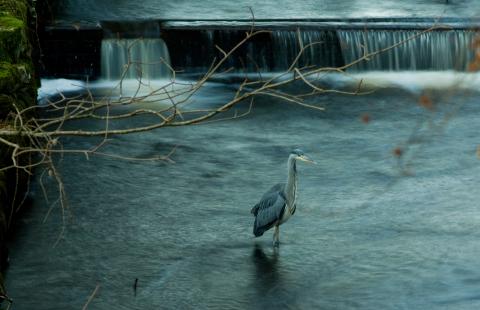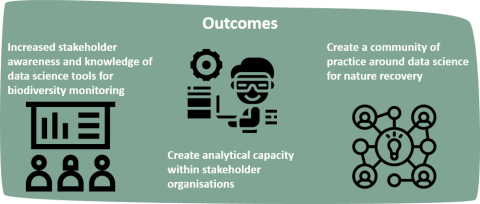This NERC Knowledge Exchange Fellowship will co-develop solutions to allow conservation stakeholders to use state-of-the-art data science techniques to assess biodiversity status. Over the next three years I will be working to translate methodological innovations in biodiversity monitoring and analysis into a form that is directly accessible to data holders, land managers, policy makers and conservation practitioners. The ultimate goal of the project is to create a community of practice around data science for conservation, where practitioners and policy makers will no longer need to rely on researchers and data scientists to monitor their environment and assess the impact of their policies and interventions on biodiversity.
Project overview

The policy context
Climate change, pollution and habitat loss are major drivers of the current biodiversity crisis. The UK Governments have responded to this challenge with ambitious policies, including the 25 Year Environment Plan and the Environment Bill, the Future Generations Act, The Environment Strategy for Scotland and the Environment Strategy for Northern Ireland. Biodiversity monitoring and reporting is at the heart of these strategies for nature recovery, to establish a baseline and track progress towards the goal of building back greener. Demand for sub-national assessments of biodiversity status has never been higher, due to the launch of Local Nature Recovery Strategies (LNRS), reforesting and rewilding initiatives, likely revisions to planning regulations and new funding for post-Brexit green recovery.
The need for knowledge exchange
In order to evaluate the success of policies and initiatives we need to monitor biodiversity to establish a baseline and track progress towards environmental goals. NERC-funded research has generated a considerable amount of knowledge and expertise around biodiversity monitoring and analysis. However, significant barriers to uptake have hampered the degree to which this knowledge has benefited organisations responsible for the delivery of environmental policy. Technical advances in biodiversity monitoring and analysis require considerable statistical expertise, technical skills and computational resources to implement. These skills and expertise are not often found outside academic and research institutions with the result that these advances in data science and statistics remain inaccessible to most end users working in nature conservation.

Outcomes
This project aims to achieve three main outcomes:
- Increase stakeholder awareness and knowledge of data science and statistical tools for biodiversity monitoring
- Data are used effectively to guide nature recovery strategies through creating analytical capacity within the stakeholder organisations
- A community of practice around the use of data science for nature recovery that will be self-sustaining beyond the lifetime of the fellowship

Project Manager
2021 - present: Ecological Modeller, UK Centre for Ecology & Hydrology, Wallingford
2018 - 2021: Research Associate Ecological Modeller, Centre for Ecology and Hydrology, Wallingford
2018: Sustainable Development Goals project officer, University of Aberdeen
2014 - 2018: PhD studentship, University of Aberdeen
